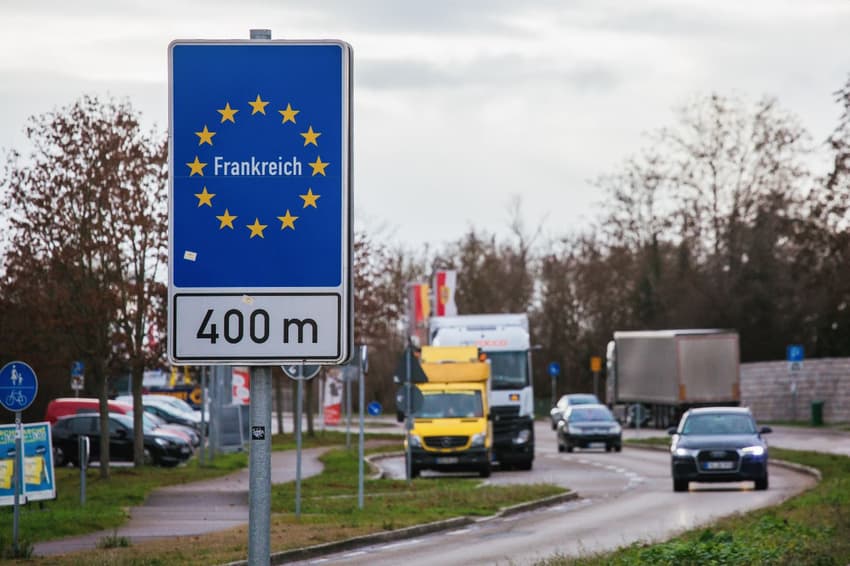Germany not ruling out French border checks over coronavirus

Germany said on Monday it would not rule out expanding
new travel controls to its French border due to Covid-19 variants surging in
the Moselle region. Paris, however, urged against border closures.
Asked about the situation in France, Angela Merkel's spokesman Steffen Seibert said Berlin was "continuing to monitor the situation and continually reviewing our measures to fight the pandemic".
He added that border closures were "not normal" and a "last resort", but said Germany was "in a situation where we need to do everything to prevent more aggressive mutations of the virus spreading as quickly in Germany as they have elsewhere".
Seibert's comments came hours after French European Affairs Minister Clement Beaune urged Germany not to close its borders with France.
"We do not want Germany to shut the border completely," said Beaune after Berlin introduced tough checks at its borders with Austria and the Czech Republic over the weekend.
READ ALSO: Germany imposes controls on Czech and Austrian borders
"We will do everything to avoid an uncoordinated decision and a nasty surprise," Beaune said.
He added that any closures should be introduced in coordination with France and include as "wide-reaching exceptions as possible" in order to protect cross-border workers.
Germany partially closed its borders with the Czech Republic and Austria's Tyrol on Sunday over a troubling surge in coronavirus mutations, defying condemnation from the European Union.
Under the new rules, only Germans or non-German residents are allowed through.
Exceptions are made for essential workers in sectors such as health and transport, as well as for urgent humanitarian reasons, according to the German interior ministry.
Everyone must be able to provide a recent negative coronavirus test.
The checks led to long traffic jams at border crossings on Monday morning, with some drivers having to wait several hours.
A surge in cases of the South African and Brazilian variants of the coronavirus in eastern French regions such as Moselle has prompted speculation that similar checks may be introduced on the French-German border.
The European Union condemned Germany's curbs, with EU Justice Commissioner Didier Reynders tweeting that the European Commission was "concerned about recent unilateral decisions" on travel.
Member States agreed on a coordinated approach on travel restrictions. ?? @EU_Commission is concerned about recent unilateral decisions. We are monitoring the situation in all MS and will follow up shortly with letters.I will also discuss the issue on 23/02 at the #GAC #COVID19 pic.twitter.com/DEjBVCsm0W
— Didier Reynders (@dreynders) February 14, 2021
France's Beaune also bemoaned the "lack of a discussion" between Berlin and the European Commission over the checks.
Yet a spokesman for the German interior ministry insisted Monday that the German policy combined "European thinking with local needs".
READ ALSO: How European countries have changed after a year of coronavirus crisis
Comments
See Also
Asked about the situation in France, Angela Merkel's spokesman Steffen Seibert said Berlin was "continuing to monitor the situation and continually reviewing our measures to fight the pandemic".
He added that border closures were "not normal" and a "last resort", but said Germany was "in a situation where we need to do everything to prevent more aggressive mutations of the virus spreading as quickly in Germany as they have elsewhere".
Seibert's comments came hours after French European Affairs Minister Clement Beaune urged Germany not to close its borders with France.
"We do not want Germany to shut the border completely," said Beaune after Berlin introduced tough checks at its borders with Austria and the Czech Republic over the weekend.
READ ALSO: Germany imposes controls on Czech and Austrian borders
"We will do everything to avoid an uncoordinated decision and a nasty surprise," Beaune said.
He added that any closures should be introduced in coordination with France and include as "wide-reaching exceptions as possible" in order to protect cross-border workers.
Germany partially closed its borders with the Czech Republic and Austria's Tyrol on Sunday over a troubling surge in coronavirus mutations, defying condemnation from the European Union.
Under the new rules, only Germans or non-German residents are allowed through.
Exceptions are made for essential workers in sectors such as health and transport, as well as for urgent humanitarian reasons, according to the German interior ministry.
Everyone must be able to provide a recent negative coronavirus test.
The checks led to long traffic jams at border crossings on Monday morning, with some drivers having to wait several hours.
A surge in cases of the South African and Brazilian variants of the coronavirus in eastern French regions such as Moselle has prompted speculation that similar checks may be introduced on the French-German border.
The European Union condemned Germany's curbs, with EU Justice Commissioner Didier Reynders tweeting that the European Commission was "concerned about recent unilateral decisions" on travel.
Member States agreed on a coordinated approach on travel restrictions. ?? @EU_Commission is concerned about recent unilateral decisions. We are monitoring the situation in all MS and will follow up shortly with letters.I will also discuss the issue on 23/02 at the #GAC #COVID19 pic.twitter.com/DEjBVCsm0W
— Didier Reynders (@dreynders) February 14, 2021
France's Beaune also bemoaned the "lack of a discussion" between Berlin and the European Commission over the checks.
Yet a spokesman for the German interior ministry insisted Monday that the German policy combined "European thinking with local needs".
READ ALSO: How European countries have changed after a year of coronavirus crisis
Join the conversation in our comments section below. Share your own views and experience and if you have a question or suggestion for our journalists then email us at [email protected].
Please keep comments civil, constructive and on topic – and make sure to read our terms of use before getting involved.
Please log in here to leave a comment.